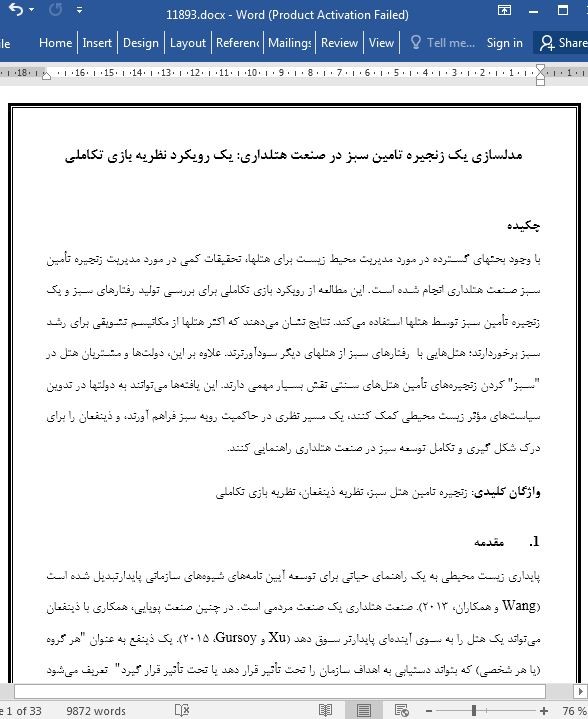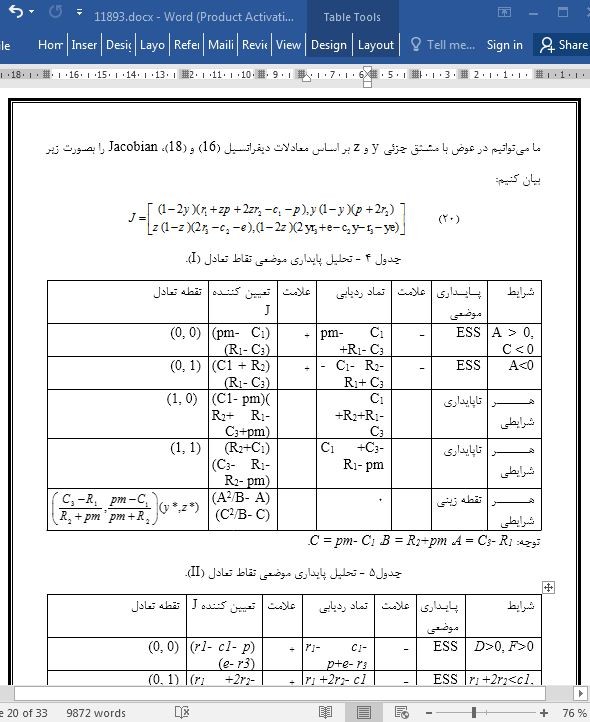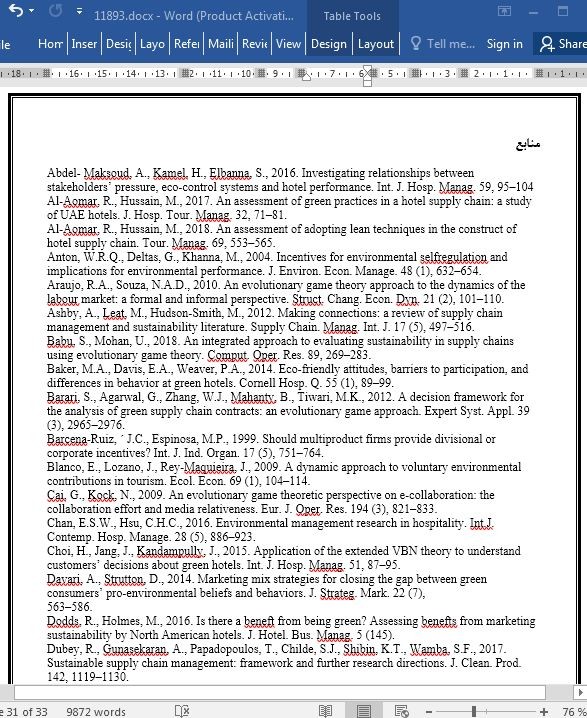
مدلسازی یک زنجیره تامین سبز در صنعت هتلداری: یک رویکرد نظریه بازی تکاملی
چکیده
با وجود بحثهای گسترده در مورد مدیریت محیط زیست برای هتلها، تحقیقات کمی در مورد مدیریت زنجیره تأمین سبز صنعت هتلداری انجام شده است. این مطالعه از رویکرد بازی تکاملی برای بررسی تولید رفتارهای سبز و یک زنجیره تأمین سبز توسط هتلها استفاده میکند. نتایج نشان میدهند که اکثر هتلها از مکانیسم تشویقی برای رشد سبز برخوردارند؛ هتلهایی با رفتارهای سبز از هتلهای دیگر سودآورترند. علاوه بر این، دولتها و مشتریان هتل در "سبز" کردن زنجیرههای تأمین هتلهای سنتی نقش بسیار مهمی دارند. این یافتهها میتوانند به دولتها در تدوین سیاستهای مؤثر زیست محیطی کمک کنند، یک مسیر نظری در حاکمیت رویه سبز فراهم آورند، و ذینفعان را برای درک شکل گیری و تکامل توسعه سبز در صنعت هتلداری راهنمایی کنند.
1. مقدمه
پایداری زیست محیطی به یک راهنمای حیاتی برای توسعه آیین نامههای شیوههای سازمانی پایدارتبدیل شده است (Wang و همکاران، 2013). صنعت هتلداری یک صنعت مردمی است. در چنین صنعت پویایی، همکاری با ذینفعان میتواند یک هتل را به سوی آیندهای پایدارتر سوق دهد (Xu و Gursoy، 2015). یک ذینفع به عنوان "هر گروه (یا هر شخصی) که بتواند دستیابی به اهداف سازمان را تحت تأثیر قرار دهد یا تحت تأثیر قرار گیرد " تعریف میشود (Freeman، 2010). گروههای اصلی ذینفعان در یک هتل گروههای داخلی (به عنوان مثال، کارمندان و مدیران) و گروههای خارجی (به عنوان مثال، مشتریان، رقبا، تأمین کنندگان) هستند. از نمودار تأمین کننده، ورودیها، فرآیند، خروجیها و مشتری (SIPOC) برای توضیح زنجیره تأمین هتل از ابتدا (تأمین کنندگان) تا انتها (مشتریان) استفاده شده است (Al-Aomar و Hussain، 2017) (شکل1).
6. نتیجه گیری، محدودیتها و دستورالعملهایی برای تحقیقات آینده
یافتههای ما دو نتیجه را حاصل میکند. مدیریت زنجیره تأمین سبز یک روش کارآمد و مؤثر برای بهبود رقابت پذیری یک نهاد (Zhu و Sarkis، 2004)، به ویژه در صنعت هتلداری است. یک تحلیل پویا نشان میدهد که نگرش یک هتل نسبت به "سبز شدن" تأثیر قابل توجهی بر درآمد آن دارد. به عبارت دیگر، هتلهایی که رفتارهای سبز را اتخاذ میکنند، نسبت به هتلهایی که رفتارهای سبز را نمیپذیرند منافع بیشتری را کسب میکنند.
Abstract
Despite extensive discussion of environmental management for hotels, little research has been done on the hotel industry’s green supply chain management. This study uses the evolutionary game approach to examine the generation of green behaviors and a green supply chain by hotels. Results show that most hotels do have an incentive mechanism for green growth; hotels with green behaviors are more profitable than those that are not. Furthermore, governments and hotel customers are critical in the “greening” of traditional hotel supply chains. The findings can assist governments in formulating effective environmental policies, provide a theoretical avenue in governing green practice, and guide stakeholders to understand the formation and evolution of green development in the hotel industry.
1. Introduction
Environmental sustainability has become a vital guide to the development of a code of sustainable organizational practices (Wang et al., 2013). The hotel industry is a people industry. In such a dynamic industry, collaboration with stakeholders can lead a hotel to a more sustainable future (Xu and Gursoy, 2015). A stakeholder is defined as “any group (or individual) who can affect or be affected by the achievement of the objectives of an organization” (Freeman, 2010). The key stakeholder groups in a hotel are internal (e.g., employees and managers) and external (e.g., customers, competitors, suppliers). The suppliers-inputs-process- outputs-customers (SIPOC) diagram was used to explain the hotel supply chain from the beginning (suppliers) to end (customers) (Al-Aomar and Hussain, 2017) (Fig. 1).
6. Conclusion, limitations and directions for future research
Our findings lead to two conclusions. Green supply chain management is an efficient way to improve an entity’s competitiveness (Zhu and Sarkis, 2004), especially in the hotel industry. A dynamic analysis demonstrates that a hotel’s attitude toward “green” has a significant effect on its revenue; in other words, hotels that adopt green behaviors reap higher benefits than hotels that do not.
چکیده
1. مقدمه
2. مروری بر مقالات
2.1. هتل سبز
2.2. مدیریت زنجیره تأمین سبز در صنعت هتل داری
2.3. کاربرد نظریه بازی تکاملی
3. توصیف مدل
3.1. مدل پایداری تکاملی رفتار سبز هتلها
3.2. مدل تکاملی ذینفعان در یک زنجیره تأمین هتل سبز
4. راه حلهای مدل
4.1. تجزیه و تحلیل ESS بین ذینفعان
4.2. تجزیه و تحلیل پایداری استراتژی
5. بحث در مورد نتایج و مفاهیم
5.1. بحث در مورد نتایج مدل
5.2. مفاهیم نظری
5.3. مفاهیم مدیریتی
6. نتیجه گیری، محدودیتها و دستورالعملهایی برای تحقیقات آینده
منابع
Abstract
1. Introduction
2. Literature review
2.1. Green hotel
2.2. Green supply chain management in the hotel industry
2.3. The application of the evolutionary game theory
3. Model description
3.1. Evolutionary stability model of hotels’ green behavior
3.2. The evolution model of stakeholders in a green hotel supply chain
4. Model solutions
4.1. ESS analysis among stakeholders
4.2. Strategy stability analysis
5. Discussion of results and implications
5.1. Discussion of model results
5.2. Theoretical implications
5.3. Managerial implications
6. Conclusion, limitations and directions for future research
References
- ترجمه فارسی مقاله با فرمت ورد (word) با قابلیت ویرایش، بدون آرم سایت ای ترجمه
- ترجمه فارسی مقاله با فرمت pdf، بدون آرم سایت ای ترجمه



